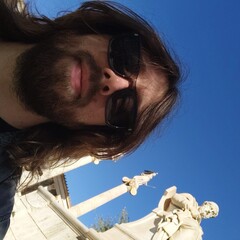
Hi,
I am Vanja, a cultural sociologist currently based in Athens, but I have spent the majority of my life in Zadar, Croatia.
I studied cultural sociology with a focus on political theory, critical thought, and the subtle ways ideology operates in everyday life. My thesis explored how democracy becomes constrained under global capitalism—not just through institutions, but through the narratives we consume and internalize. My work and interests sit in between critical theory, digital culture, and symbolic systems, whether those are myths, ideologies, or media simulations.
Specifically, I’m interested in how something as great as the internet could have led to its current state. “The current state” I refer to can be summarized in multiple buzzwords: fake news, bots, brainrot, polarization, tailored content, ideological pipelines, toxicity, post-truth, cognitive bias, attention economy, AI, etc., etc. “The current state” makes the users miserable, but it does generate some great revenue for the Big Tech companies. In that regard, I’m much more interested in tackling this problem, and for me, the first step is understanding and discussing the issues at hand. The critical theory of Jean Baudrillard and Slavoj Žižek left the most imprint on me in this regard.
But you have to make this life livable, and to that end, I love how art and other cultural forms create meaning.
What I’m interested in the most is connecting how some ideas were represented over time and cultures. These shared patterns of ideas might be recognized as archetypal, and to me, recognizing those patterns and their shared importance over time and places is a nice way of understanding the human condition. Mythology, in that sense, is just another tool of our brain to organize the chaotic existence, and I believe there’s always something to learn from it. Be it religions, astrology, tarot, or a new-age teaching, I like to focus more on what function the meaning of those provides to us. There is always a rich historical and psychological perspective to be learned from those. The works of David Graeber, C.G. Jung, and Joseph Campbell have left the strongest impact on me in this regard.
Finally, contemporary media is where the ancient narratives get retold to answer the societal context of today. One of the challenges of our time is not just understanding the world but navigating it without falling into cynicism or wishful thinking. I believe that symbolic thinking, when combined with critical awareness, can help us understand both ourselves and our cultures more fully. I find analyzing political narratives, movies, anime, and video games the best way to exemplify both of my main interests. This issue, in my opinion, grows in importance with the ever-expanding territory of online “content” production.
A few more words about me: after graduating, I worked on managing EU-funded projects related to cultural routes, waste management, urban mobility, and similar strategic points of interest. I managed teams and project budgets, while also writing reports and case studies on these issues. For more than 3 years now, I have worked in customer support in an international corporation setting. The main benefit of this is meeting so many people of different backgrounds with similar interests or wildly different interests. One of my favorite stories is The Epic of Gilgamesh. Not just because it’s old, or that the story is captivating, or that the aesthetics of Sumerian culture hit a spot for me, but because I love the idea that 5000 years ago, in a society completely different from ours today, people were contemplating what the point of life is. I believe One Piece should be read by everyone everywhere, for the sake of humankind. I’ve watched the NBA for more than 15 years; my favorite book is Memoirs of Hadrian by Marguerite Yourcenar; my favorite game is Final Fantasy IX. I also never really know what to say about myself, so I generally prefer it when someone asks me directly if something interests them.


